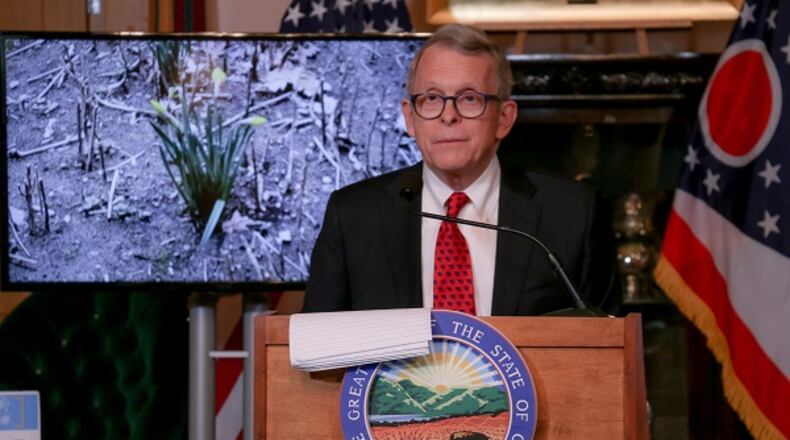“Commercial activity is slowing down dramatically across the state of Ohio,” DeWine said at his daily briefing on the coronavirus. “One of the consequences of that of course is that state revenues will go down dramatically. It’s important, as governor, that I take action now.”
RELATED: DeWine’s first year in office: ‘You can tell he’s loving being governor’
On Sunday, Ohio Department of Health Director Amy Acton signed an order that Ohio’s 11.7 million residents stay at home, except for essential work, appointments and errands. The order takes effect at 11:59 p.m. Monday but includes large numbers of exceptions for essential work in health care, food supply, construction, manufacturing, financial services and other professional services.
DeWine said violations of the stay-at-home order are subject to enforcement by local public health and police and that bars that defy orders may be subject to losing their liquor licenses.
Childcare centers operating after March 26 must have temporary pandemic licenses. Slots in these centers will be prioritized for health care and first responder workers. The child care center closures impacts about 7,442 licensed centers that care for 285,000 children.
The Ohio Department of Health reported 442 confirmed cases, including 104 hospitalizations and six deaths. Other deaths are under investigation. Ohio is not reporting negative test results because both public and private labs are conducting tests and only positive reports are filtering up to the Ohio Department of Health, Dr. Acton said.
In Miami County, public health officials are investigating two clusters in nursing homes in Troy and Tipp City. Three Koester Pavilion residents have died — one tested positive for COVID-19 while the other two have results pending.
Dr. Acton said Ohio is following CDC guidance and learning lessons from other states and countries about cases in nursing homes. Some personnel, such as respiratory therapists, travel between facilities so ODH and the homes are working on strategies to stop the spread, she said. “Everyone is really trying to row in the same direction.”
RELATED: Who is Dr. Amy Acton?
Dr. Acton advised primary care doctors to use telemedicine to take histories of patients and members of their household and recommend home isolation for those with symptoms. Doing so will preserve personal protective equipment such as masks and gloves.
“Of the PPE, we have a very limited supply we’ve received federally and we have a small cashe…here in our state. We are getting that out to our local health departments today,” Dr. Acton said. “We are talking small boxes, not truckloads, of PPE.”
Inside Ohio prisons, 11 inmates have been tested — 10 came back negative, one is pending, according to the Department of Rehabilitation and Correction. Social distancing is very difficult among the state’s 48,000 inmates in 27 adult prisons.
“It is something that we are very focused on. I can guarantee you that the director has been preparing for this for sometime,” DeWine said. “Testing will go on in the prisons when there is reason for that testing to go on.”
New arrivals to DRC are kept in reception centers for five weeks to mitigate the risk of spreading the virus to the general prison population, he added.
MORE COVERAGE: Coronavirus puts strain on homeless system, officials say
State lawmakers are scheduled to return to Columbus this week to take up a number of COVID-19 related measures such as scrapping state-mandated standardized testing K-12 schools this year, making changes to the unemployment compensation system and giving drivers a grace period for driving on expired licenses because the BMV offices are closed.
One of the biggest items is to establish a new date for Ohio’s postponed primary. The League of Women Voters of Ohio and dozens of other groups sent a letter to legislative leaders and Ohio Secretary of State Frank LaRose on Monday asking for more than two dozen changes around absentee voting, early in-person voting, poll worker pay and emergency preparedness.
FRANKS’ TAKE: Neighborhood kids are getting creative with their time
DeWine declined to give his top five requests but said of lawmakers: “I know they share my sense of urgency.”
The House and Senate have yet to agree on a fix for the state’s private school voucher program. Eligibility for the program is set to expand significantly beginning April 1, unless lawmakers agree to a compromise.
About the Author

